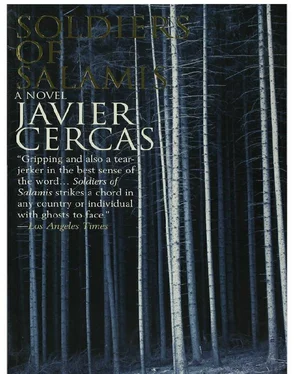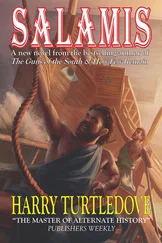Javier Cercas
Soldiers of Salamis
For Raul Cercas and Mercè Mas
This book is the fruit of extensive reading and long conversations. Many of the people to whom I am indebted appear in the text with their full names; among those who do not, I want to mention Josep Clara, Jordi Gracia, Eliane and Jean-Marie Lavaud, José-Carlos Mainer, Josep Maria Nadal, Carlos Trías, and especially Mónica Carbajosa, whose doctoral thesis, The Prose of '27: Rafael Sánchez Mazas has been immensely useful. To all of them: thank you.
IT WAS THE SUMMER of 1994, more than six years ago now, when I first heard about Rafael Sánchez Mazas facing the firing squad. Three things had just happened: first my father had died; then my wife had left me; finally, I'd given up my literary career. I'm lying. The truth is, of those three things, the first two are factual, even exact; but not the third. In reality, my career as a writer had never actually got started, so it would have been difficult to give it up. It'd be more accurate to say I gave it up having barely begun. I'd published my first novel in 1989; like the collection of stories that appeared two years earlier, the book was received with glaring indifference, but a combination of vanity and an enthusiastic review written by a friend from those days contrived to convince me I could one day become a novelist and, to do so, should quit my job as a journalist and devote myself entirely to writing. The results of this change in lifestyle were five years of economic, physical and metaphysical anguish, three unfinished novels and a dreadful depression that knocked me back into an armchair in front of the television for two whole months. Fed up with paying the bills, including the one for my father's funeral, and watching me stare at the blank television screen and weep, my wife moved out as soon as I started to recover, and I was left with no choice but to forget my literary ambitions and ask for my old job back at the newspaper.
I'd just turned forty, but luckily — or because I'm not a good writer but nor am I a bad journalist, or, more likely, because there was no one at the paper willing to do my job for a salary as meagre as mine — they agreed. They assigned me to the culture section, which is where they put people they don't know what to do with. At first, with the undeclared aim of punishing my disloyalty — given that, for some journalists, a colleague who leaves journalism to write a novel is nothing less than a traitorthey made me do everything but get the boss's coffee from the bar on the corner, and very few colleagues refrained from indulging in sarcasm and irony at my expense. Time must have blunted the memory of my infidelity: soon I was editing the odd piece, writing articles, doing interviews. That was how, in July 1994, I ended up interviewing Rafael Sánchez Ferlosio, who was giving a series of lectures at the university at the time. I knew Ferlosio was extremely reluctant to speak to journalists, but thanks to a friend (or rather a friend of that friend who'd organized Ferlosio's stay in the city), I managed to get him to agree to talk to me for a while. Calling that an interview would be going a bit far; if it was an interview, it was the weirdest one I've ever done. To begin with, Ferlosio showed up on the terrace of the Bistrot surrounded by a swarm of friends, disciples, admirers and hangers-on; this, added to an obvious lack of attention to his clothes and a physical appearance that inextricably blended the manner of a Castilian aristocrat ashamed of being one with that of an old Mongol warrior — massive head, unruly hair streaked with grey, hard, emaciated, difficult face, large nose and cheeks shadowed with incipient beard — might have suggested, to an uninformed observer, a religious guru surrounded by acolytes. Moreover, Ferlosio roundly refused to answer a single one of the questions I put to him, claiming he'd given the best answers he was capable of in his books. This doesn't mean he didn't want to talk to me; quite the contrary: as if seeking to refute his reputation for unsociability (or perhaps it's just unfounded), he was extremely cordial, and the afternoon flew by as we chatted. The problem was that if I asked him, say, about his division of literary personae into those of fate and those of character, he would contrive to answer me with a discourse on, say, the causes of the rout of the Persian fleet in the battle of Salamis; whereas when I tried to extract his opinion on, say, the pomp and ceremony of the celebrations of the five hundredth anniversary of the conquest of the Americas, he would answer me by describing, with a wealth of gesticulation and detail, say, the correct use of a jack plane. It was an exhausting tug-of-war, and it wasn't until the last beer of the evening that Ferlosio told the story of his father facing the firing squad, the story that's kept me in suspense for the last two years. I don't remember who mentioned the name Rafael Sánchez Mazas or how it came up (maybe it was one of Ferlosio's friends, maybe Ferlosio himself), but I do remember Ferlosio telling us:
'They shot him not far from here, at the Collell Sanctuary.' He looked at me. 'Have you ever been there? Me neither, but I know it's near Banyoles. It was at the end of the war. The 18th of July had caught him in Madrid, and he had to seek refuge in the Chilean Embassy, where he spent more than a year. Towards the end of '37 he escaped from the Embassy and left Madrid hidden in a truck, perhaps with the aim of getting to France. However, they arrested him in Barcelona and, when Franco's troops were about to reach the city, took him to Collell, up near the border. That's where they shot him. It was an execution by firing squad en masse, probably chaotic, because the war was already lost and the Republicans were rushing helter-skelter for the Pyrenees, so I don't think they knew they were executing one of the founders of the Falange, and a personal friend of José Antonio Primo de Rivera at that. My father always kept the trousers and sheepskin jacket he was wearing when they shot him, he showed them to me many times, they're probably still around; the trousers had holes in them, because the bullets only grazed him and he took advantage of the confusion of the moment to run and hide in the woods. From there, sheltering in a ditch, he heard the dogs barking and the shots and the soldiers' voices as they searched for him knowing they couldn't waste much time searching because Franco's troops were on their heels. At some point my father heard branches moving behind him; he turned and saw a militiaman looking at him. Then he heard a shout: "Is he there?" My father told how the soldier stared at him for a few seconds and then, without taking his eyes off him shouted, "There's nobody over here!", turned and walked away.'
Ferlosio paused, and his eyes contracted into a knowing expression of boundless mischief, like a little boy holding back his laughter.
'He spent several days hiding in the woods, living on what he could find or what they gave him at the farms. He didn't know the area, and moreover he'd broken his glasses, so he could hardly see; that's why he always said he'd never have survived if he hadn't met some lads from a nearby village — Cornellá de Terri it was called, or issome lads who protected and fed him until the Nationalists arrived. They became great friends, and when it was all over he stayed at their house for a few days. I don't think he ever saw them again, but he talked to me about them more than once. I remember he always called them by the name they'd given themselves: "the forest friends".'
That was the first time I heard the story told, and that's how I heard it. As for the interview with Ferlosio, I finally managed to salvage it, or perhaps I made it up: as far as I recall, not once did he allude to the battle of Salamis (but he did discuss the distinction between personae of character and personae of fate), nor to the exact use of a jack plane (but did expound on the pomp of the five hundredth anniversary celebrations of the discovery of America). Nor did the interview mention the firing squad at Collell or Sánchez Mazas. Of the first I knew only what I'd just heard Ferlosio tell, of the latter not much more; at that time I'd not read a single line of Sánchez Mazas, and to me he was no more than a mist-shrouded name, just one more of the many Falangist politicians and writers that the last years of Spanish history had hastily buried, as if the gravediggers feared they weren't entirely dead.
Читать дальше












